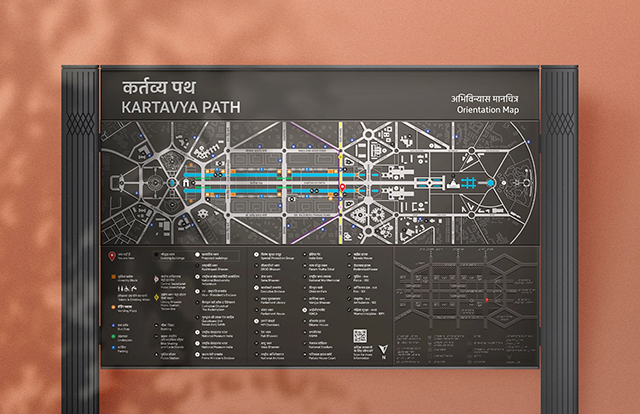
Human beings have constantly aimed for sustainability for our race with better, healthier and safer living conditions, advanced industrial processes, quicker transport, greater job security, assured food supplies — and so on. Yet, the results we have obtained have been paradoxical to our mission for longevity and security. Now, the planet on which we live faces Global Warming and Climate Change. We humans, as all living creatures, face a survival crisis.
The 33rd Lopez Forum at our Gurgaon studio brought together leading experts on sustainability with the mission to make the precepts and knowledge relatable to us designers. As problem solvers, we first need to understand the problems first hand to overcome any superficial attempts to make sustainable solutions.

Our speakers offered four perspectives – philosophical ‘ecosophy’ by Aseem Shrivastava, the economics of sustainability by Meena Vaidyanathan, global to national perspectives by Narendra Taneja, while Harsh Purohit delved into sustainability language — myths and terminologies.
The mirror reflects the truth
Aseem Shrivastava, writer and ecological economist, shared several witty anecdotes. One was about a wealthy British acquaintance, a fund manager whose passion was to fund conservation efforts for habitats. A lucid graph, drawn by the friend, reinforces the obvious truth of rampant development. Shrivastava explains, “QE (Quantitative Easing) has been growing exponentially while the number of species going extinct is the mirror image of the previous graph. The growing monetization of the economy is directly proportionate to the commodification of nature.”

Shrivastava teaches ecosophy. He follows a theologian called Raymond (also Raimon) Panikkar (1918-2010), whose definition of the field he finds most apt. “I would elaborate on it as the ‘wisdom of the earth’ which is the only home in the cosmos. Our entire way of looking at ourselves is from the outside, and we forget that we don’t have anywhere else. We are not even remotely able to go and inhabit another planet. The question is — have we learned the art of living?”
When Shrivastava refers to the graph that inherently symbolizes his friend’s pursuits as ‘Adam’s two worlds’, he touches on a truism. Adam is a fund manager by profession who moonlights on sustainable practice. If Adam was able (he is a smart man by all descriptions), he would have coalesced his twin pursuits of wealth and sustainability. However, by Shrivastava’s account, he is forced to separate these worlds in order to make them function, like day and night, reinforcing that economic growth and sustainability will more often be two forces at odds with each other. The idealistic balance is only that — an ideal. And so, like Penelope, Adam must weave by day and undo by night.
Globalization vs survival
The rich OECD countries command and manufacture the narratives around Climate Change, claiming to be the credible authority, says Narendra Taneja. As Chairman of the Independent Energy Policy Institute, Taneja is a powerful voice shaping how we think about energy security and its impact on our climate. Taneja is emphatic when he says, “The debate on Global Warming has to be democratized, free of the hegemony of the Global North.”

Taneja’s talk Energy, Climate and the New World Order encapsulated how energy is at the core of alliances between nations. Powerful nations exert their control over smaller dependent economies through energy resources. Elucidating on the tilted structure of economies, he pointed out, “With 4.6 billion energy consumers in Asia, the axis has already shifted here. But the West does not want any structural change” He goes on to say, “We (India) are today an oil economy subsisting on imports from overseas, roughly 88%. We import our solar solutions from China. We are therefore dependent on foreign supplies, and vulnerable to being arm-twisted.”
To a layperson as myself, the image of the world appears like a body, where everything is interrelated. In this system, the head rules and the rest of the body follows. There appears to be no choice. How can India break free, for instance, to independently create her own solutions?
Taneja believes that hope lies in breakthroughs in technology. “Solutions need to be built here and implemented here in the Global South — in New Delhi, in Dar-e-Salaam, in Jakarta, in Hanoi. We need to start respecting ourselves to believe that we can create these solutions, instead of relying on Berlin or Washington.”
Little things matter
In her talk, The Economic Cost of Being Unsustainable, Meena Vaidyanathan shifted the plane to talk about changes we can make every day. Vaidyanathan is a strong believer in implementing sustainability practices. “Sustainability is not just about being environmentally sound. It’s also about social equity. So many organizations are facing difficulties because of financial unsustainability, bad governance decisions. Well-known brands with potential, face problems because of ESG (environmental, social and governance)”

Vaidyanathan started Niiti Consulting as a Private Limited Company and a virtual platform to facilitate socio-economic change. “We wanted to do social good but we also wanted to be profitable. Even though we are in the space of doing social good, we wanted to make sure we have enough diversity.” From this foundational basis Vaidyanathan and her team have been enthused about encouraging even a small kirana store to adopt sustainable practices. Ultimately her venture is how to make ESG work by demonstrating its potential to get increased market share, to attract customers and employees, to get more investments and so on — to make a real difference to businesses. She says, “Our aim is rather audacious: we are working with a large reputed university as well as a foundation and several fin-techs (both early stage and mature). By the end of 2026 we will be able to impact 25 million women.”
Vaidyanathan is interested in the real deal, and making a measurable impact. Indian origin companies that have done well in this sector are critical for rationalizing the argument. She quotes the example of SELCO, a long-established solar enterprise. “In Mizoram and Meghalaya, the only health centers that are running in the middle of the bad weather, despite the cyclone, with the electrical shut down (right now) are the SELCO centers.” Akshayakalpa sells organic dairy products based on a circular economy model. An Ahmedabad-based organization works with urban slums towards equitable cities. “Collectively we owe it to ourselves to get these examples of real people and real stories and then scale them up. Because these are the stories that will help us to see what is working on the ground. Boondh boondh se sagar…”
Sustainable talk and trade
Sustainability strategist Harsh Purohit engaged the audience with several precepts of sustainability. Recycling is one: When HP found out that customers were getting printer toner cartridges refilled by local dealers, they came up with an initiative. They offered to pick up the cartridge by FedEx at no cost to the user, which they would refill and sell back with a guarantee. A solution that is both economically sensible and feasible. Purohit, who is the founder-director of Cognito points out that use-and-throw happens only because we are not charged for disposal. “PAYT (Pay-As-You-Throw) breaks with tradition by treating trash services just like electricity, gas, and other utilities.”

Purohit turns the tables on the argument about Save the Planet. “Everybody sees sustainability differently: this is a big branding mishap. Environmentalists see sustainability in their way and are happy with their definition. People use Climate Change and Global Warming interchangeably. Including sustainability professionals. But semantics matter. It’s not about Saving the Planet. We are selfish people, only interested in our survival.”
In all of this, Purohit turns the onus on to designers, who he says have been instrumental in creating a consumerist society. In fact, all of the evolved terminologies around the topic seem to merely represent cover-ups for not being sustainable from using jute bags over plastic (more energy is consumed in manufacturing the jute bag) to the BOBOS (bourgeois bohemians) who travel out every weekend in a Thar to go birdwatching. Purohit’s mandate is to rethink design itself — here, he says, is the big opportunity.
The home, the heart, the way
Several of Shrivastava’s anecdotes revolve around the concept of the home, the kitchen and food. He laments the disintegration of the home front. Even when he talks about ecosophy as the ‘wisdom of the earth’, he comes back to how the earth is home.

Why does Shrivastava speak so much of the home? Economics comes from the conjunction of two Greek words: oikos — household and nomos — the way. Ecology is made of oikos — household and logos — meaning word, thought, principle or speech. At the heart of ecological balance is the idea of home, and at the heart of economics is the way we run our homes. The ecosystem is the home for all organisms in a geographical area and their lives are interconnected.
“We are living in strange times, when it’s very clear what’s going wrong but we are not able to see the pattern for some reason.” Shrivastava sees the trends as the devaluation of the home happening through the commercialization of life and nature, contrary to mammalian needs. ‘Finding our way home’ and literally finding what home means — as individuals, as nations, as ‘earthlings’ emerges as critical to the path for sustainability, for survival.

More Articles
Related Projects
A Walk along Kartavya Path
WAYFINDING STRATEGY + SIGNAGE SYSTEM + TECHNICAL DETAILING + SUPERVISION & QC + TYPEFACE CUSTOMIZATION
VIP
BRAND STRATEGY + BRAND IDENTITY
Join our mailing list
Receive our periodic newsletter on Branding, Experience, and Design thinking.
More Articles
The Simple Truth about Design is Complicated
MYOPIA
Follow us on
Insights
Follow Us
© 2025 Lopez Design Pvt. Ltd. All rights reserved



